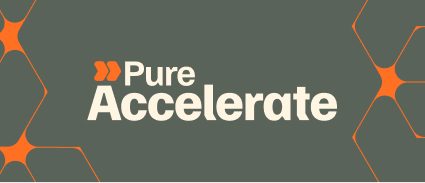Dismiss
Innovation
A platform built for AI
Unified, automated, and ready to turn data into intelligence.
Dismiss
June 16-18, Las Vegas
Pure//Accelerate® 2026
Discover how to unlock the true value of your data.
Dismiss
NVIDIA GTC San Jose 2026
Experience the Everpure difference at GTC
March 16-19 | Booth #935
San Jose McEnery Convention Center
What Is MySQL? And Why Is It Still the Most Popular Database?

What Is MySQL? And Why Is It Still the Most Popular Database?
Whether you’re running an online store, managing a product landing page, or setting up a personal blog, you need a database to store and manage the data that powers your applications on the web. For many businesses and personal users, MySQL is among the first database services you’ll encounter, often as a one-click install in popular web builders like WordPress. But what exactly is MySQL and how does it work? In this article, we’ll answer these and other questions as we investigate the most popular database on the web.
What Is MySQL?
MySQL, often pronounced “my sequel,” is an open source relational database management system (RDBMS) that uses a client-server model. It isn’t a programming language. Instead, it’s the most commonly used database management system. It’s called MySQL because its co-founder Michael Widenius often names projects after his children. MySQL is named after his daughter My. SQL stands for Structured Query Language and is the language of choice for sending queries to relational databases.
How Does MySQL Work?
In the simplest terms, a MySQL database works via the client-server model in which a client (device) connects and submits queries to a server which returns with a response. Today, this is typically done within a graphical user interface (GUI) on the client side, and there are many popular GUIs to choose from such as MySQL Workbench, Sequel Pro, and dbForge Studio. When selecting a GUI to work with MySQL, the lighter and more user-friendly it is, the more efficient your data management processes will be.
How Much Does MySQL Cost?
MySQL is free and open source software. As long as you’re using MySQL together with a web server (even a commercial web server), it’s free to use. The only time it will begin to incur a cost is if you intend to sell a modified version of MySQL. You also have the option to purchase MySQL Enterprise Edition.
Is MySQL Still Open Source?
MySQL is still open source software under the GNU General Public Licence (GPL). This licence states that “Everyone is permitted to copy and distribute verbatim copies of this licence document, but changing it is not allowed.”
MySQL is supported by large online communities of open source developers. Furthermore, the GNU General Public Licence Preamble states that they’re committed to openness.
Does Oracle Own MySQL?
Yes. Oracle owns MySQL. In 2008, Sun Microsystems purchased MySQL for $1 billion. Two years later, Oracle purchased Sun Microsystems for $7.4 billion. Through this acquisition, Oracle acquired MySQL.
Many people feared that Oracle would shut down MySQL, which was supporting thousands of businesses and websites. Contrary to what many believed, Oracle has proven to be very effective in managing the open source properties that it has acquired over the years. Oracle didn’t turn MySQL into freemium software to push sales of the Enterprise Edition either.
MySQL Market Share: How Popular Is MySQL?
As of 2021, MySQL has a market share of 46.83% in the relational-database space, with more than 140,000 current customers. While MySQL may have fewer features than its main competitors, it doubles down on efficiency of implementation for features that the majority of people need, including:
- Dual Passwords - providing an easy way to update passwords
- Data Dictionary - metadata is stored in a data dictionary, freeing up inodes
- JSON Document Validation - rejects bad JSON data
There was a concern that MySQL would become far less popular after it was acquired by Oracle. However, even after being acquired, the software still functioned in much the same way it had. It even retained core features, which, at the time, set it apart from larger competitors and has allowed it to maintain its market share to this day.
Three Advantages of MySQL:
MySQL has three main advantages to improve the reliability, versatility, and performance of your organisation’s data infrastructure.
- 24x7 uptime: Many businesses use MySQL because they have numerous high-availability solutions. One of the main advantages of using MySQL is that your data has the protective benefits of specialized cluster servers and regular backups to separate nodes or data centers.
- Multi-platform projects: MySQL was designed as a cross-platform database server, so it runs on Linux, macOS, and Windows. If you’ve got multi-platform projects, MySQL is for you.
- Flawless performance: If your website is getting millions of daily queries, MySQL’s ability to ensure optimum speeds for even the most demanding tasks means that your business or website will perform as needed and without interruption.
In addition to the uptime, performance, and cross-platform compatibility, MySQL is a free tool with very little barrier to entry.
Three Disadvantages of MySQL:
MySQL has three main disadvantages compared to its competitors. These may be a setback for some, but depending on the needs of your organisation may not be an issue.
- Large databases: While MySQL can handle a large database, it doesn’t do it efficiently.
- Debugging: MySQL development and debugging tools aren’t as feature-rich as other paid competitors.
- Stability: There are concerns that the way in which MySQL handles transactions is inefficient and prone to stability issues, which doesn’t make it suitable for that type of application.
At the end of the day, MySQL is a simple, easy-to-use, relational database designed to handle structured data. In a world where big data is increasingly unstructured, that can be considered a disadvantage, especially if you have to store streaming analytics from thousands of IoT devices.
When Should You Use MySQL?
MySQL is great for small to medium-sized businesses and personal users looking for a simple, easy-to-use database for their applications with reliable uptime. With its high-availability options, common issues with human error, network failure, or planned maintenance won’t take you offline and away from your customers.
Due in part to its open source nature, MySQL can offer substantial savings over other database options. MySQL also offers licencing fees and support at costs that are often lower than its competitors yielding a lower total cost of ownership (TCO).
Conclusion
MySQL is an open source relational database management system with platform independence and myriad uses and functionality. You can use it for a team working from different devices. You can even utilize instances of MySQL offered by cloud providers. If your company needs a low-cost solution for your database that offers the flexibility to grow as you do, has the support of a large community, and gives you peace of mind with state-of-the-art, high-availability, and security features, then you should look at MySQL.
We Also Recommend...
Browse key resources and events

TRADESHOW
Pure//Accelerate® 2026
June 16-18, 2026 | Resorts World Las Vegas
Get ready for the most valuable event you’ll attend this year.
PURE360 DEMOS
Explore, learn, and experience Everpure.
Access on-demand videos and demos to see what Everpure can do.

VIDEO
Watch: The value of an Enterprise Data Cloud
Charlie Giancarlo on why managing data—not storage—is the future. Discover how a unified approach transforms enterprise IT operations.
RESOURCE
Legacy storage can’t power the future
Modern workloads demand AI-ready speed, security, and scale. Is your stack ready?
Personalize for Me